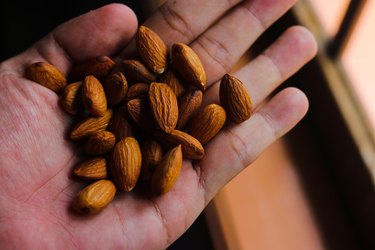
Ever chowed down only to notice a metallic taste in your mouth after eating? It's unpleasant and mysterious, but fortunately, there are some common reasons why this can happen.
Here, we explain the potential causes of that metal aftertaste, plus what you can do to avoid it in the future.
Video of the Day
Video of the Day
1. Food Allergy
Food allergies occur when your immune system overreacts to a particular ingredient, according to the Mayo Clinic. This stimulates your body to release chemicals called histamines, which trigger symptoms anywhere from minutes to hours after you've eaten the wrong thing.
A metallic, bad taste in your mouth is one such symptom of allergies, per the Cleveland Clinic. This symptom is more common if you have an allergy to shellfish or tree nuts (like cashews and almonds).
A metallic aftertaste can be an early sign of anaphylaxis, an extreme allergic reaction where your throat closes up and makes it difficult to breathe, according to the Mayo Clinic. Anaphylaxis can be deadly, so it's important to seek emergency medical attention immediately.
Beyond a metallic taste in your mouth after eating, other symptoms of a food allergy include:
- Tingly or itchy mouth
- Hives or eczema
- Swelling
- Wheezing, nasal congestion or trouble breathing
- Digestive discomfort like belly pain, diarrhea, nausea or vomiting
- Dizziness, lightheadedness or fainting
The best way to avoid a metallic taste when you eat if an allergy is to blame? Skip that food altogether to prevent symptoms.
Tip
You may not experience all of the above symptoms when you have an allergic reaction. For instance, you might only notice a metal taste in your mouth and diarrhea. Regardless, though, visit your doctor to identify the source of your allergies and find the best treatment, per the Mayo Clinic.
2. Supplements
If you take supplements with your meal, this could be the cause of the metallic taste in your mouth when eating.
Indeed, minerals like zinc, chromium, copper, calcium and iron can all be the reason why you taste metal when you eat, especially if you're taking these supplements in high doses, according to the Cleveland Clinic.
Luckily, the taste should subside as your body digests the nutrients.
3. Substances in Meat
If you've ever wondered why meat tastes like metal, certain substances may be to blame. For instance, fish and other seafood can sometimes contain high amounts of mercury, which can produce a metallic taste in your mouth after eating, per the Cleveland Clinic.
Organ meats like liver and tripe are also rich in iron, according to the Cleveland Clinic, which can likewise cause a metallic taste when eaten in large doses.
Warning
If you know you've been exposed to high levels of mercury — through food or otherwise — see your doctor immediately, per the Cleveland Clinic.
4. Cancer Treatment
If you're undergoing cancer treatment, it may be the reason why everything tastes metallic, according to the Mayo Clinic. That's because treatments like chemotherapy or radiation can affect your palate and cause food to taste flavorless, overly sweet, salty or metallic.
Typically, though, this side effect is only temporary and will fade. Nonetheless, if you're noticing a metal taste in certain foods, you can supplement your diet with other ingredients that taste better. You can also opt for plastic silverware to avoid an added metallic aftertaste, per the Mayo Clinic.
Was this article helpful?
150 Characters Max
0/150
Thank you for sharing!
Thank you for your feedback!
Is this an emergency? If you are experiencing serious medical symptoms, please see the National Library of Medicine’s list of signs you need emergency medical attention or call 911.